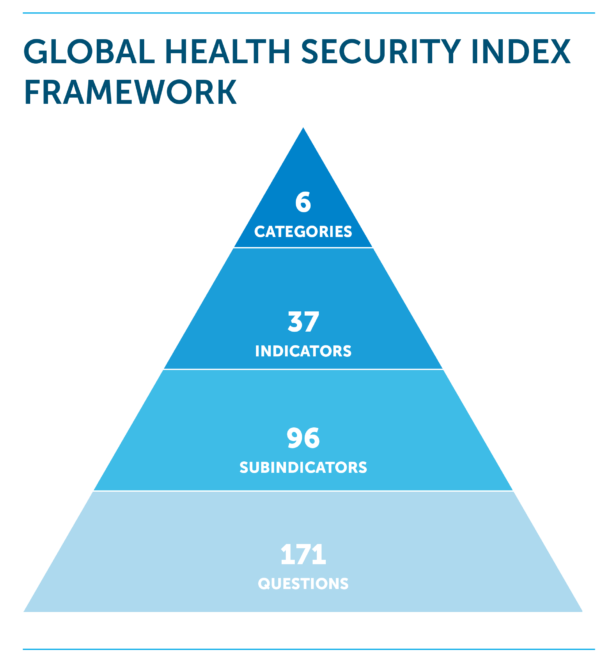Governance
Global Health Security Index 2021
- 10 Dec 2021
- 7 min read
Why in News
Recently, the Global Health Security (GHS) Index 2021 has been recently released.
- In India NITI Aayog releases its own health index.
Key Points
- GHS Index:
- About:
- It is an assessment and benchmarking of health security and related capabilities across 195 countries.
- It has been developed in partnership by the Nuclear Threat Initiative (NTI) and the Johns Hopkins Center.
- NTI is a nonprofit global security organization focused on reducing nuclear and biological threats imperiling humanity.
- Johns Hopkins Center was created to recognize the crucial role of communication in public health.
- Methods of Ranking:
- The GHS Index assesses countries’ health security and capabilities across six categories.

- The six categories are as follow:
- Prevention: Prevention of the emergence or release of pathogens.
- Detection and Reporting: Early detection and reporting for epidemics of potential international concern.
- Rapid Response: Rapid response to and mitigation of the spread of an epidemic.
- Health System: Sufficient and robust health system to treat the sick and protect health workers.
- Compliance with International Norms: Commitments to improving national capacity, financing plans to address gaps, and adhering to global norms.
- Risk Environment: Overall risk environment and country vulnerability to biological threats.
- The index measures countries’ capabilities from 0-100, with 100 representing the highest level of preparedness. The GHS Index scoring system includes three tiers.
- Low Scores: Countries that score between 0 and 33.3 are in the bottom tier.
- Moderate Scores: Countries that score between 33.4 and 66.6 are in the middle tier and
- High Scores: Countries that score between 66.7 and 100 are in the upper or “top” tier.
- The GHS Index assesses countries’ health security and capabilities across six categories.
- About:
- Ranking:
- India’s:
- India, with a score of 42.8 (out of 100) has slipped by 0.8 points since 2019.
- World:
- Three neighbouring countries of India like Bangladesh, Sri Lanka and Maldives have improved their score by 1-1.2 points.
- The world’s overall performance on the GHS Index score slipped to 38.9 (out of 100) in 2021, from a score of 40.2 in the GHS Index, 2019.
- In 2021, no country scored in the top tier of rankings and no country scored above 75.9.
- India’s:
- Overall Performance of the Countries:
- Unprepared for Future Epidemic:
- Countries across all income levels remain dangerously unprepared to meet future epidemic and pandemic threats.
- This, even as infectious diseases are expected to have the greatest impact on the global economy in the next decade.
- Countries across all income levels remain dangerously unprepared to meet future epidemic and pandemic threats.
- Insufficient Health Capacities:
- All countries had insufficient health capacities.
- This left the world acutely vulnerable to future health emergencies, according to the Index that measured the capacities of 195 countries to prepare for epidemics and pandemics.
- All countries had insufficient health capacities.
- National Public Health Emergency:
- 65% of assessed countries had not published and implemented an overarching national public health emergency response plan for diseases with epidemic or pandemic potential.
- Medical Countermeasures:
- 73% of countries did not have the ability to provide expedited approval for medical countermeasures, such as vaccines and antiviral drugs, during a public health emergency.
- Thus, the world was acutely vulnerable to health emergencies in the future.
- Lack of Financial Investments:
- Most countries, including high-income ones, have not made dedicated financial investments in strengthening epidemic or pandemic preparedness.
- Close to 79% of the 195 countries assessed had not allocated national funds within the past three years to improve their capacity to address epidemic threats.
- Most countries, including high-income ones, have not made dedicated financial investments in strengthening epidemic or pandemic preparedness.
- Public Confidence in their Governments:
- A whopping 82% of countries have low to moderate levels of public confidence in their government.
- Health emergencies demand a robust public health infrastructure with effective governance. But the trust in government, which has been a key factor associated with success in countries’ responses to Covid-19, is low and decreasing.
- A whopping 82% of countries have low to moderate levels of public confidence in their government.
- Unprepared for Future Epidemic:
- Recommendations:
- Allocate Health Security Funds:
- Countries should allocate health security funds in national budgets and conduct assessments using the 2021 GHS Index to develop a national plan to identify their risks and fill gaps.
- Additional Support:
- International organizations should use the GHS Index to identify countries most in need of additional support.
- Involvement of Private Sector:
- The private sector should use the GHS Index to look for opportunities to partner with governments.
- New Financing Mechanisms:
- Philanthropies and funders should develop new financing mechanisms and use the GHS Index to prioritize resources.
- Allocate Health Security Funds:
Status of India’s Health Response
- Underprepared:
- The influenza A (H1N1) outbreaks since 2009 in Rajasthan, Maharashtra, Tamil Nadu and other States have acutely underscored the need for better detection, awareness of symptoms and quarantining.
- Covid-19 pandemic has also shaken the foundations of India’s healthcare system.
- Low Expenditure:
- Health expenditure by the government in India is less than 1.35% of Gross Domestic Product, which is low for a middle-income country.
- Availability of Health Professionals:
- There is one doctor for every 1,445 Indians as per the country's current population estimate of 135 crore, which is lower than the World Health Organization (WHO) prescribed norm of one doctor for 1,000 people.
- Impact of Climate Change:
- India’s health status is being worsened by climate shocks.
- According to the Climate Vulnerability Index, more than 80% of Indians live in climate vulnerable districts.
- India’s health status is being worsened by climate shocks.






